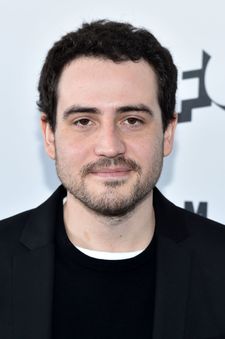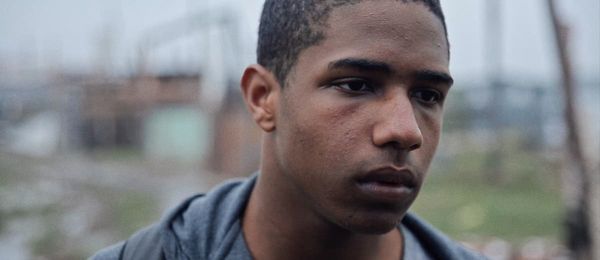Brazilian-American filmmaker Alexandre Moratto won the Someone To Watch prize at the 2019 Film Independent Spirit Awards for his feature debut Socrates, which finally reached UK cinemas and VoD this week. It was a deserving win for a lean and emotionally resonant portrait of 15-year-old Socrates' (Christian Malheiros) resilience in the face of grief, poverty and his burgeoning sexuality. Chatting to the director - who was largely raised in the US and now splits his time between there and Brazil - he admits "it's really strange " to find himself promoting the film again because of the situation with the pandemic but that it was "a nice surprise", adding, "It's like a second life for the movie."
 |
| Director Alexandre Moratto |
"I volunteered at the Quero Institute when I was 19, this was in 2009, actually remember Rahmin Bahrani, the producer on this film, was the person who suggested I go and do this and that was a really formative experience in my life because I was with people my own age from a totally different background and socio not just socio economic background but but just a totally different world and life and, and we just really got along.
"They use filmmaking as a tool to give educational opportunities to young people and basically the young people will work on short films, they'll make, write, direct, produce and do everything on a short film. The philosophy is that through that collaborative process, they'll become more prepared for adult life. So we're talking 16 to 20 year olds, before going to college or before graduating high school. So, you know, the older batch of young people, who are more mature and more ready to take on adult things.
"We had this dream. I promised them, I said, 'I'll come back and we'll make a movie together.' And, and I did, it just it took a long time for me to find the right project for them for us. And but when I did, I knew it was right and so we went right into it. From when I volunteered to when I made the film, you could really see a distinct difference in my work because I was still doing film school. After I volunteered, my work took on a different tone - I think more realistic and more embedded in communities and cultures that aren't usually represented."
There were about 60 young people on the crew that Moratto worked with on the film "split into two classes", one of older teens, who were more hands-on and younger ones who would rotate in and out of the set.
Moratto adds: "I think I walked into it without any expectations but I knew that we were going to make the film. I said, 'Why don't we do this instead of the short film and let's do it like we did before, when I was here, volunteering' - that they'd do everything. Because I only learned by doing. I always preferred it that way, so I thought maybe other people would too.
"I didn't expect that they would be involved in the writing of a script. That I didn't expect. When we workshop the scripts with them, which was very important to me. So for instance, we would put a round table or chairs in a circle at the university offices they would use. We would just sit there with all of them, and we would have like a handful of printed copies, everyone would kind of be sharing. I think we did two or three of those, where we would read and discuss. And then and I took their feedback and listened to what they had to say
"One of the young people from the Institute, Thayná Mantesso, who was 18 at the time, was brought on to be my assistant during the film - but she just had so much more to give and a really great ear for dialogue. So I kind of just slowly let her in more and more. First it was dialogue and then it was scenes and then it was bigger picture things. And finally, I was like, you know, you're getting credit on this."
Moratto says it wasn't just the young people who benefitted from the collaboration. "I like to joke that I learned more than they did, because, I mean, I learned so much just about being a better leader and a better professional and a more patient person. Things I'm still working on but you know, it was just a crash course in humanity."
The film is dedicated to his own mum, who died in 2014 and perhaps that's why the sense of grief of Socrates - whose mother dies in the first moments of the film - feels particularly tangible and raw.
"I think at that moment of my life, it was so ingrained, I didn't even realise that's what I was doing, it's just what it was," he says.
The stars of the film - Malheiros and Tales Ordakji who plays the slightly older boy Maicon that Socrates embarks on a tentative sexual relationship with - are professionally trained and theatre seasoned actors. But that wasn't something Moratto initially expected.
"I thought we were going to go down the non-professional route," he says. "And for a while we were. We auditioned over 1000 people. And I had this, I guess, this just insane idea in my head that working with actors wouldn't make it as real, which now I realise is just complete insanity. Now all I want to do is work with actors. It just makes my life easier."
The film is lean and spare, which was something that Moratto empphasised after realising in the editing suite that the quieter moments when the camera just stays with Socrates were working well.
"When we shot more It was like, like, what can we shoot that has no dialogue that was really like the first thing we thought of like, just watching people think and watching them walk around," he says.
Asked if his background in documentary short filmmaking helped in terms of being able to watch people and have patience with that, he says: "I never stopped to think about that. But, yeah, I think documentaries can help just about any filmmaker. I think just being able to sort of watch people and to learn how to capture things without having to do too much intervention. Sometimes you just have to know, if we don't roll the camera right now and do it, we're never going to get that thing that's happening in the background. So that helps to have a documentary background."
Moratto is now working on a project he can't say much about for Netflix, which will be produced by Socrates collaborators Bahrani and Fernando Meiralles, but speaking about the future he says: "Right now I feel like I'm in this really fortunate place of being able to make these films from these original scripts that I've been writing about issues or people or communities or personal matters that are very important to me and that I feel the need to express."
Socrates was released in the UK by Peccadillo on Friday, September 4, for details of cinemas where you can see the film and details of how to stream it at home, visit the official site.






















